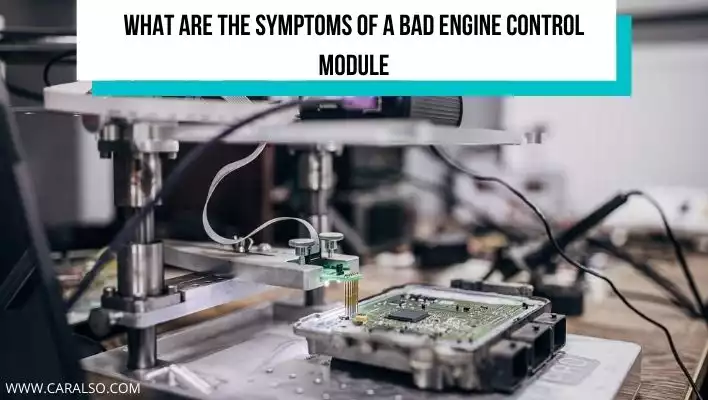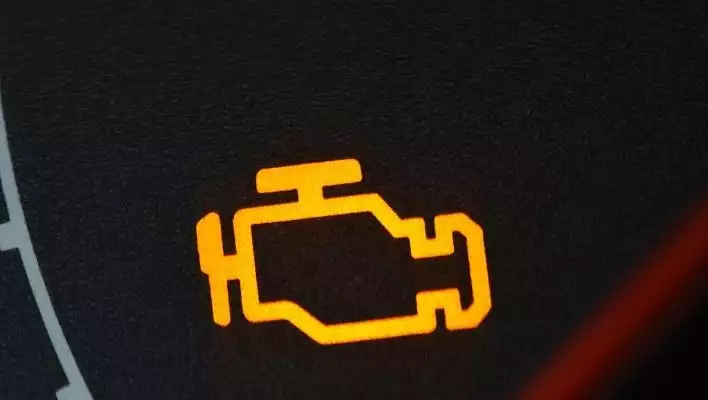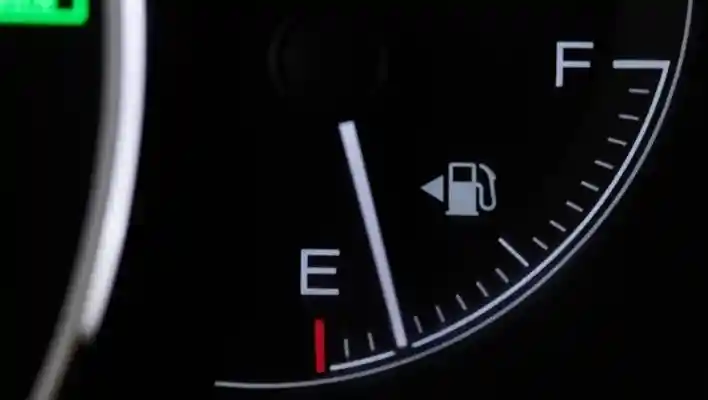Symptoms of a bad ECU are comparatively hard to diagnose because an engine control unit (ECU) is your car’s brain, requiring some advanced expertise.
Diagnosing a bad ECU computer is impossible by looking at them; you must check some of your car components and test.
But, knowing some most common symptoms of a bad ECM will help you to determine.
Knowing your ECU is bad is not enough because you must take steps to fix your bad Engine Control Module (ECM) as fast as possible because your vehicle won’t operate properly with a faulty ECM.
So, let’s see the symptoms of a bad engine control module and what to replace to fix a bad ECU.
What Is An ECU On A Car
The engine control unit (ECU) is also known as the engine control module (ECM).
An ECU is an electronic module or a device that maintains and controls the engine function in the vehicle.
ECM gets data from some electronic components and sensors of a car and uses that data to control the car engine. That’s why if your car’s ECU computer goes bad, it affects the whole vehicle’s performance.
Symptoms Of A Bad ECU
When your vehicle engine control unit (ECU) is bad, you are going to see the check engine light on in your car. Exercising poor engine performance and ECU overheating also indicate a faulty ECU.
Through mechanical analysis and some of the manufacturer’s engineering experiences, they come up with some of the most common symptoms that will help you detect ECU failure symptoms.
Here are some most common bad ECU symptoms :
- Car Won’t Start
- Loss Of Acceleration
- Check Engine Light On
- Car Engine Stalls Or Misfires
- The drop In Fuel Economy
- Poor Engine Performance
- ECU Getting Overheated

These are the seven most common signs of a bad ECU, and you have to check those symptoms to be certain your car ECU computer is going bad.
1. Car Won’t Start

The engine control unit has control all over the car. So, the ECU computer must be working properly to start the engine and run it.
Your car can fail to start if your car computer does not work. If the car doesn’t start, this is another common symptom that tells you a car is having issues with the engine control module (ECM).
You should also check the other components if your car doesn’t start.
Check the car battery connection, starter, and other essential components, but if you don’t get the clue, you must check the ECU in your car.
To test the ECU or ECM, you should have some experience. If you don’t have any knowledge or experience about the car computer, you should not do it yourself; get a mechanic, and leave it to them.
2. Loss of Acceleration
It’s always easy to notice if you have less acceleration in the car, and loss of acceleration is another sign of a bad ECU.
A vehicle’s engine control unit (ECU) is directly connected with the transmission control module (TCM) because the ECU computer helps the TCM make proper adjustments for your car’s acceleration.
Therefore, when ECU goes bad, the transmission control module (TCM) is not able to operate properly, which leads to the car’s loss of acceleration.
The engine control module (ECM) gating data, and with that data, ECU adjusts the throttle accordingly, smooth and effortless shifting of car transmission.
So, it’s obvious that if the ECU is defective, it won’t be able to adjust your car’s transmission, and you will experience less power of acceleration.
3. Check Engine Light Is On

The check engine light will notify you with warning lights on the dashboard whenever something happens to the car’s engine control unit.
When the check engine light is on, the defective circuit, sensor, or electronic component must be checked.
So, when you see the check engine light on, you should taste your car’s engine control unit as soon as possible.
Seeing the check engine lights on is the most common sign that tells your car ECU Goes bad.
But, you have to check why the check engine light comes on because there can be other reasons behind Check Engine lights on.
If there is something wrong with the engine control unit, the Onboard Diagnostics II (OBD2) will show some of the code, and you need to address them properly.
4. Car Engine Stalls or Misfires

Frequently your car engine can stall or misfire for a bad or faulty engine control unit.
But, there can be other reasons why your engine misfires or stalls. To specify whether your car’s ECU or other components for making the engine misfire or stall, you have to check ECU and other components in the vehicle.
If your car engine stalls or misfires for ECU, that means your engine control module gets false data from the sensors.
Car engine misfires or engine stalls can make a car’s performance so poor.
So, if your car has an engine misfire or stalls issue, you have to have an engine control unit tested by a professional.
5. The Drop-in Fuel Economy

Whether you say poor fuel economy, bad gas mileage, or a drop in fuel economy, all of them are the same.
As I said earlier, the ECU is the brain of a vehicle. An ECU gathers data from the vehicle’s sensors and electronic components, and using this data, the ECU controls the whole car.
So, when the ECU is not well or won’t be able to collect data from the sensors, it’s so obvious that the ECU won’t be able to maintain the air-fuel ratio.
And eventually, you will experience a drop in fuel economy or bad mileage.
If you notice you have bad gas mileage, you should check the car computer because a sudden drop in fuel economy is also a strong symptom of a bad ECM.
After noticing poor fuel economy in your car, you should take steps as soon as possible.
6. Poor Engine Performance
As a car owner, you might know that if your car’s combustion chamber doesn’t get the engine fuel, then the car engine performance will decrease.
Car engines cannot get enough fuel to the combustion chamber for various reasons, but one of them is a bad ECU.
Poor engine performance also can cause damage to or destroy a car engine if it exists for an extended period of time.
Noticing poor engine performance is easy because if your car engine performance goes down, the car will shake and vibrate.
Poor engine performance is a very strong symptom of a bad engine control module.
7. ECU Getting Overheated
Car ECU gets some normal heat from the processors, transistors, or chips. But, your car ECU computer frequently gets overheated. This is not good for your ECU because overheating can damage the ECU.
An overheated ECU can bring some issues in the vehicle because an overheated ECU can’t control the vehicle properly.
The car ECU will be defective if the engine control unit gets excessively heated frequently.
Check the heating level or temperature of your car ECU computer. Some code can appear if your car ECU gets overheated.
What To Test Or Replace To Fix A Faulty ECU
Repairing or fixing a faulty engine control unit (ECU) can be very hard for you if you don’t have previous experience and not enough knowledge about the ECU.
And repairing a defective ECU is not that easy. Without proper knowledge of the engine control module (ECM), you should not try fixing or repairing the ECU by yourself. Leave your ECU to a professional if you want to fix that.
Here are some recommendations for replacing, testing, and fixing your ECU :
- Ignition Coils: The vehicle ignition coil transforms the battery’s voltage all over the vehicle’s electrical system from the vehicle’s ignition system. If you have a faulty ECU in your car, then you have to check the Ignition coil to replace or fix it.
- Faulty Spark Plugs: Faulty spark plugs might need to be changed or repaired when your car engine control unit is not working properly.
- Fuel Injection: Test fuel injection when your vehicle has a bad ECU. But you have to test or check the Fuel injection properly.
- Mass Air Flow: Check the mass airflow in your vehicle. Make sure the mass airflow or air flow is working properly in your vehicle.
- Throttle Position Sensor (TPS): The throttle position sensor (TPS) is directly connected to the ECU. That’s why to fix or repair the ECU; you have to test the throttle position sensor.
- Idle Air Control Valves: The Idle air control valve is also known as IAC. Test the Idle air control valves to look for an issue that is preventing the ECU from working.
- Test Grounds With A Multimeter: Testing grounds with a multimeter is the best way to test or check the grounds in the car. That’s why we recommend you test grounds with a multimeter if you want to fix a bad ECU.
As we mentioned earlier, repairing a faulty ECU is not easy. No matter how long you’ve been driving, you have to have proper knowledge and experience to fix a bad ECU.
ECU Replacement Cost
A faulty ECU repair can cost you about $1500 to $2500, and the ECU repairing cost also depends on the car’s model.
An ECU computer is one of the expensive components. On average, replacing the Engine control unit can cost you around $500 to $2000 only for ECU. And the ECU replacement labor cost can be between $100 and $300.
If your car’s ECU goes bad, then it will need to be replaced or reprogrammed. The replacement or reprogramming of the ECU is not cheap; it’s way more expensive.
Typically, the entire ECU replacement cost goes up to $1000 on average.
But you have to keep in mind that the engine control module is different for every model.
A luxury car’s ECU is different from a low economy car. That’s why ECU replacement costs vary on your vehicle.
How To Test Faulty ECU
Using a multimeter, you can test faulty ECU in your car. Whether you want to test your normal ECU or bad ECU, a multimeter can give you a proper test result.
Step 1: Set up Multimeter
To find a faulty ECU in your car, you are also going to set up a multimeter to your car.
Connecting a multimeter to your car engine control unit is easy and simple.
Step 2: Start Testing ECU
First, you need to test your car’s ECU and write down the voltage of the ECU on a piece of paper.
See the ECU test reading on ECU and remember the voltage is necessary to diagnose a faulty ECU.
Step 3: Check Battery Voltage
After you check the engine control unit voltage, now you need to test the battery voltage.
You can also test your car battery’s right time voltage with a multimeter.
Step 4: Match Up ECU And Battery Voltage
Now you have tested both the ECU and the car battery with a multimeter. And also have the voltage readings.
If the battery reading and ECU reading are not relevant, that means your car has a faulty ECU.
You can also follow this video guide to test a faulty ECU:
Can A Bad ECU Cause Overheating?
A faulty ECU can cause overheating of your vehicle because the engine control unit controls the car engine.
When your car computer or ECU is not working properly, it easily damages the engine, leading to your car overheating.
A bad ECU cannot only overheat your car engine, it can also bring several issues on a car’s fuel-air mixture, car maintenance, acceleration and more components.
Can A Bad ECU Cause A Car Not To Start?
A bad ECU causes a car not to start, so when your car’s ECU is bad, you are going to experience a car that won’t start frequently.
The most common sign of a faulty engine control unit is a car won’t start.
Avoid trying too much to start your vehicle; if your car’s ECU is not operating, that won’t be able to start.
In this situation, getting your car engine control unit tested by a professional is the best and most useful way to bring your car back to the road again.
Can ECU Be Repaired?
By reprogramming, an engine control unit can be repaired. But, in many cases, an ECU cannot be repaired.
If you have a bad engine control unit (ECU), it’s necessary to take better care so that it’s not going to be bad.
For reprogramming and repairing an ECU, you will need a professional with experience and knowledge about ECU repairing. The cost of repairing an ECU is high.
Final Thoughts
There can be many symptoms of a bad ECU. But we shared the most common symptoms of a bad engine control module.
You should check the ECU properly if you notice these signs in your car.
Waiting for the ECU to be fixed automatically can be foolish because a faulty ECU will bring more issues in your car that put your car in real danger.
So, after noticing a car has an ECU issue, you must try to repair or fix the ECU as soon as possible.
Repairing an ECU is not for everyone. If you’re only a car driver, you should not try fixing or repairing the ECU.
You should bring your car to an auto mechanic to fix your car ECM for you because an auto mechanic has the experience and proper knowledge about the engine control unit.
If you try to repair the ECU by yourself, it can be more difficult for the mechanic to fix it.
Whether your car has a bad ECU or you want to repair the ECU, you should contact a mechanic for better service as fast as possible.

Hey there,
How is it going?
I’m Meraj Sarker. I am a Car Mechanic and a student of Automobile Restoration here in Florida, USA. I’ve been studying automotive for around 9 years now. So you can rely on my recommendation. For me, studying and getting knowledge about automobile it’s really fun and entertaining. I will help you to get solutions for your car through this website. If you need any help let me know.
